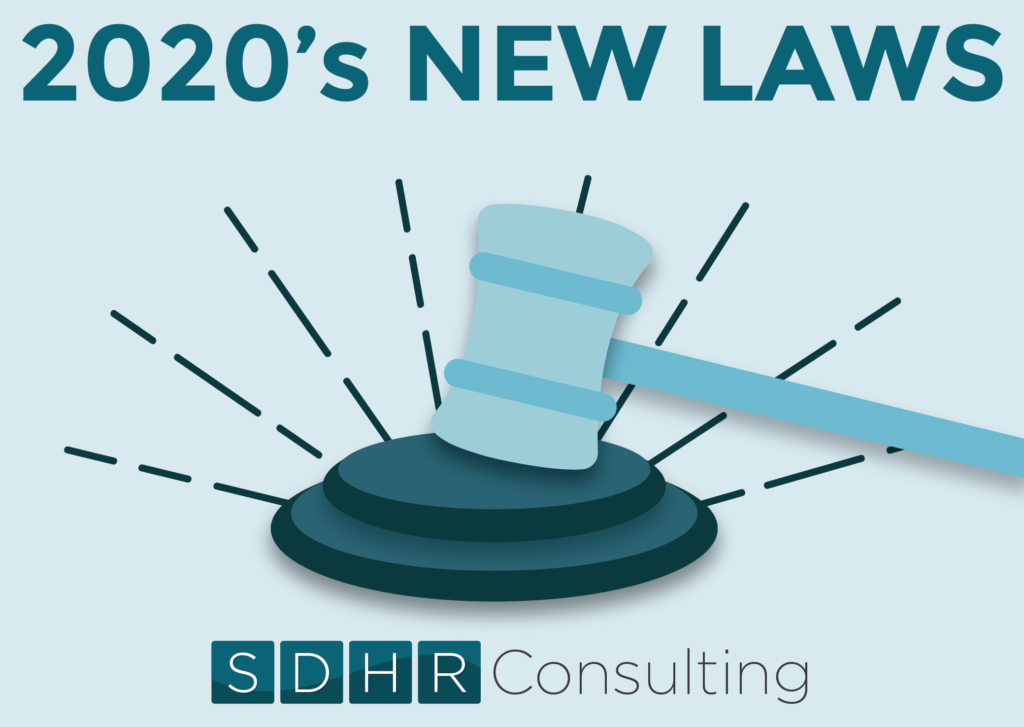
Welcome to the New Year and to several new laws going into effect that California employers should know. Some of these new laws have made big news, such as the Independent Contractor Bill (AB5), while other new laws may have made a smaller splash in the media but all have equally important changes. Below is a summary of the new laws and important changes to keep you clear and compliant in 2020.
California’s New Laws
AB 5 – Independent Contractors
• In 2018, the California Supreme Court developed the “ABC test” for determining if an employer can retain someone as an independent contractor or they should hire them as an employee under the CA Industrial Welfare Commission Wage Orders.
• AB 5 puts the ABC test into law and expands it by increasing the fines and remedies that can be assessed.
• Under the ABC test, the person must be classified as an employee unless they meet all three of the following:
1. The employer does not control the person’s performance of the work other than to give general guidelines of what is needed and the deadline for when it needs to be accomplished;
2. The person performs work that is not part of the usual business of the employer; and
3. The person is engaged in an independently established trade, occupation or business of the same nature as the work performed for the employer.
• AB 5 does define numerous exceptions from the ABC test for various industries and work that is being performed. These exceptions are still subject to the “Borello test” which can be less strict and mainly focuses on the employers’ control over the work.
• It is important to ensure that employees are classified correctly under AB 5 as misclassification can have a significant financial impact on an employer.
California State Minimum Wage Increases
• Effective January 1st, 2020 the minimum wage for both non-exempt and exempt employees is increasing.
For non-exempt employees:
• $13/hour for employers with 26 or more employees
• $12/hour for employers with 25 or fewer employees
For exempt employees:
• $54,080/annual ($4,506.67/month) for employers with 26 or more employees
• $49,920/annual ($4,160/month) for employers with 25 or fewer employees
• Many cities in California have higher minimum wages than the State minimum so it is important to be aware of your city’s requirements as well.
Discrimination, Harassment, and Retaliation
• SB 188 expanded discrimination on the basis of race to prohibit discrimination against employees based on their natural hairstyles including hair texture and hairstyles such as ‘braids, locks, and twists’.
• Under current law, employees have one (1) year to file a complaint with the Department of Fair Employment and Housing (DFEH) if they feel they have been a victim of discrimination, harassment, and retaliation. AB 9 extends this limit to three (3) years in which they can file a claim.
• It is more important than ever that employers use good practices when dealing with discrimination, harassment, and retaliation issues and keep detailed and accurate documentation.
Harassment Prevention Training – CA Requirement for CA Employees
• Employers with 5 or more employees must provide one hour of harassment prevention training for all nonsupervisory employees and 2 hours of this training to supervisors.
• SB 778 pushes the deadline for complying back to January 1, 2021.
• SB 530 pushed the training requirement back for seasonal and temporary employees. Beginning January 1, 2021, these employees must be trained within 30 days or 100 hours of employment.
Arbitration and Settlement Agreements
• AB 51 bans mandatory arbitration agreements between an employer and its employees after January 1, 2020. It also prohibits retaliation and discrimination against an employee who refuses to enter into the agreement.
• AB 749 says that employers, as part of a settlement agreement, cannot contain a ‘no rehire’ clause that would prohibit the employee from working for the employer.
• It is important to ensure that these documents are written in a way that complies with these laws.
Privacy
• The 2018 Californa Consumer Privacy Act (CCPA) changes consumer data collection rules for many employers.
• AB 25 exempts employee data from the CCPA for one year as long as the information is collected and used within the context of the employment relationship.
• If an employer is subject to CCPA, they must still comply with the requirement to disclose the kinds of personal information collected from applicants and employees and how it will be used.
• The CCPA continues to be refined and changed so it is important to determine if the employer must comply with CCPA and to keep up with the changes that may be made to it in the future.
Wage and Hour
• AB 673 allows employees to recover civil penalties for unpaid wages. Previously the employee had to go through the Labor Commissioner.
• The amount that the employee can recover can be quite substantial so it is important to ensure that wages are being paid on time to employees.
Lactation Accommodation
• California expanded the requirements for lactation accommodation. Currently, the employer must provide a location other than a bathroom for this.
• The new requirements state that the lactation room must be close to the employee’s work area, be safe and clean, contain a surface to place items on, contain seating and have access to electricity. They also must provide a sink with running water and a refrigerator suitable for storing breast milk close to the employee’s work area.
Reporting of Occupational Injuries and Illnesses
• AB 1804 requires employers to report serious workplace injuries, illnesses or death immediately by telephone or e-mail. Failure to do so carries a $5,000 civil penalty.
Paid Family Leave
• Beginning July 1, 2020, employees may receive wage replacement for up to 8 weeks if they are absent from work to care for a seriously ill family member or to bond with a minor child within one year of birth or placement of the child via foster care of adoption. The current maximum is 6 weeks.
Federal New Laws
A new W-4 has been released for 2020 and employers should begin using it immediately for new hires. The employee will no longer be asked to provide a Withholding number. Instead, depending on their situation, they will need to use the instructions and worksheets to calculate dollar amounts to enter into the W-4. The idea behind the redesign is for the employee to be able to calculate more accurate deductions from their paychecks for their Federal Taxes. You can find a copy of the new W-4 here.
For those employers who have employees who reside outside of California, you should also be aware of the changes made at the Federal level in regards to exempt/non-exempt status and overtime.
• Beginning January 1, 2020, the minimum salary for an employee to be exempt from overtime is increasing to $684 per week ($35,568 a year)
• An employee who makes less than the minimum salary is classified as non-exempt and must be paid 1 ½ times their regular rate of pay for all hours over 40 during a workweek.
• Please note that just because an employee makes a higher wage than the above, they may still be entitled to overtime depending on their job duties and if they do not fall under one of the categories that is allowed to be exempt.
• It is important to ensure that your employees are classified correctly as this can be costly to a company if they have employees who are misclassified as exempt when they should be non-exempt.





